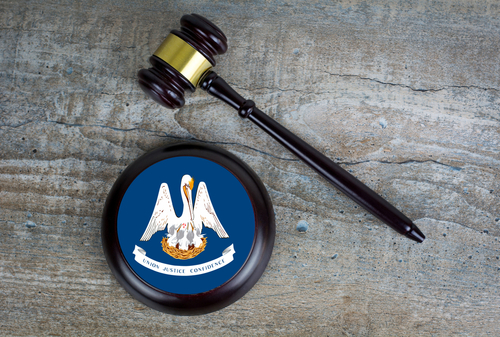Louisiana man’s jokes about sheriff’s department are protected free speech, 5th Circuit says

A three-judge panel of the 5th U.S. Circuit Court of Appeals at New Orleans found that a district court erred when it dismissed the claims of a Louisiana man that his First Amendment and Fourth Amendment rights were violated when he was arrested as a terrorist in 2020. Image from Shutterstock.
A federal appeals court has ruled in favor of a Louisiana man who was arrested after posting on Facebook that a local sheriff’s department had ordered its deputies to shoot people who were infected with COVID-19.
In its Aug. 25 decision, a three-judge panel of the 5th U.S. Circuit Court of Appeals at New Orleans found that a district court erred when it dismissed the claims of Waylon Bailey of Louisiana that his First Amendment and Fourth Amendment rights were violated when he was arrested as a terrorist in March 2020.
Bailey’s arrest came after he posted this message, mostly written in all caps: “SHARE SHARE SHARE ! ! ! ! JUST IN: RAPIDES PARISH SHERIFF’S OFFICE HAVE ISSUED THE ORDER, IF DEPUTIES COME INTO CONTACT WITH ‘THE INFECTED’ SHOOT ON SIGHT …. Lord have mercy on us all.”
He included the hashtag “#weneedyoubradpitt,” which references World War Z, a 2013 zombie movie starring Brad Pitt.
In coming to its decision, the 5th Circuit noted that content-based restrictions on speech are generally only permitted in cases involving advocacy that is likely to incite imminent lawless action and true threats. The appeals court said neither of those categories were found in Bailey’s case.
“The post did not direct any person or group to take any unlawful action immediately or in the near future, nobody took any such actions because of the post, and no such actions were likely to result because the post was clearly intended to be a joke,” according to the opinion. “Nor did Bailey have the requisite intent to incite; at worst, his post was a joke in poor taste.”
While Bailey was arrested for “terrorizing,” the 5th Circuit also said his Facebook post should not be considered a “true threat,” which encompasses statements in which a speaker meaningfully communicates a serious intent to commit an act of unlawful violence.
Bailey brought his lawsuit against Randell Iles, a Rapides Parish, Louisiana, detective, and Sheriff Mark Wood, whom the district court found were entitled to qualified immunity in the case. The 5th Circuit disagreed, noting that the Louisiana terrorizing statute requires that targeted communication have “an immediacy element concerning the false information” and “causation of ‘sustained fear.’”
“Iles is not entitled to qualified immunity because no reasonable officer could have found probable cause to arrest Bailey for violating the Louisiana terrorizing statute in light of the facts, the text of the statute and the state caselaw interpreting it,” the appeals court said.
The 5th Circuit reversed the district court’s grant of summary judgment to the defendants and remanded the case for further proceedings.
Courthouse News Service, which has coverage, said the officers’ counsel did not respond to requests for comment.
Bailey’s appellate attorney, Ben Field of the nonprofit Institute for Justice, reportedly said the “ruling makes clear that the First Amendment applies with full force to online speech and that government officials cannot stretch the law to target people who make jokes about them.”



